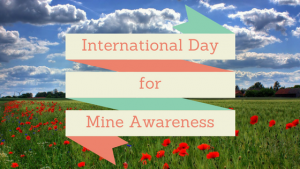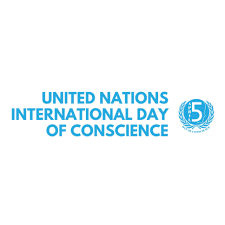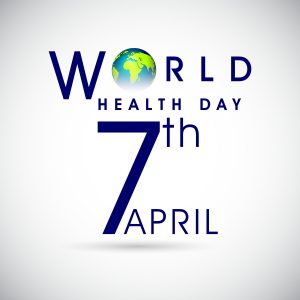4 April – International Mine Awareness Day
 Last year, the United Nations mine action community stepped-up to the challenges faced during the Covid-19 pandemic. The sector continued to deliver results, fulfilling obligations, surveying, clearing, training, and eradicating the threat of landmines and explosive ordnance. The United Nations system advanced its work to mitigate the threat of improvised explosive devices and strengthened and built new partnerships. In 2021 the COVID-19 challenges will require perseverance. Work will continue, landmines and explosive ordnance will be cleared, exit strategies and capacity development of national partners will carry on. The mine action community will continue to adapt. The United Nations will ensure to carry forward progress towards a world free from the threat of landmines and unexploded ordnance.
Last year, the United Nations mine action community stepped-up to the challenges faced during the Covid-19 pandemic. The sector continued to deliver results, fulfilling obligations, surveying, clearing, training, and eradicating the threat of landmines and explosive ordnance. The United Nations system advanced its work to mitigate the threat of improvised explosive devices and strengthened and built new partnerships. In 2021 the COVID-19 challenges will require perseverance. Work will continue, landmines and explosive ordnance will be cleared, exit strategies and capacity development of national partners will carry on. The mine action community will continue to adapt. The United Nations will ensure to carry forward progress towards a world free from the threat of landmines and unexploded ordnance.
https://www.un.org/en/observances/mine-awareness-day
5 April – International Day of Conscience
 The preamble to the Universal Declaration of Human Rights states that “disregard and contempt for human rights have resulted in barbarous acts which have outraged the conscience of humankind, and the advent of a world in which human beings shall enjoy freedom of speech and belief and freedom from fear and want has been proclaimed as the highest aspiration of the common people.” Moreover, article 1 of the Declaration states that “all human beings are born free and equal in dignity and rights and are endowed with reason and conscience and should act towards one another in a spirit of brotherhood.” The task of the United Nations to save future generations from the scourge of war requires transformation towards a culture of peace, which consists of values, attitudes and behaviours that reflect and inspire social interaction and sharing based on the principles of freedom, justice and democracy, all human rights, tolerance and solidarity, that reject violence and endeavour to prevent conflicts by tackling their root causes to solve problems through dialogue and negotiation and that guarantee the full exercise of all rights and the means to participate fully in the development process of their society.
The preamble to the Universal Declaration of Human Rights states that “disregard and contempt for human rights have resulted in barbarous acts which have outraged the conscience of humankind, and the advent of a world in which human beings shall enjoy freedom of speech and belief and freedom from fear and want has been proclaimed as the highest aspiration of the common people.” Moreover, article 1 of the Declaration states that “all human beings are born free and equal in dignity and rights and are endowed with reason and conscience and should act towards one another in a spirit of brotherhood.” The task of the United Nations to save future generations from the scourge of war requires transformation towards a culture of peace, which consists of values, attitudes and behaviours that reflect and inspire social interaction and sharing based on the principles of freedom, justice and democracy, all human rights, tolerance and solidarity, that reject violence and endeavour to prevent conflicts by tackling their root causes to solve problems through dialogue and negotiation and that guarantee the full exercise of all rights and the means to participate fully in the development process of their society.
https://www.un.org/en/observances/conscience-day
7 April – World Health Day
 On World Health Day, 7 April 2021, we will be inviting you to join a new campaign to build a fairer, healthier world. We’ll be posting more details here shortly, but here’s why we’re doing this: Our world is an unequal one. As COVID-19 has highlighted, some people are able to live healthier lives and have better access to health services than others – entirely due to the conditions in which they are born, grow, live, work and age. All over the world, some groups struggle to make ends meet with little daily income, have poorer housing conditions and education, fewer employment opportunities, experience greater gender inequality, and have little or no access to safe environments, clean water and air, food security and health services. This leads to unnecessary suffering, avoidable illness, and premature death. And it harms our societies and economies. This is not only unfair: it is preventable. That’s why we are calling on leaders to ensure that everyone has living and working conditions that are conducive to good health. At the same time we urge leaders to monitor health inequities, and to ensure that all people are able to access quality health services when and where they need them.
On World Health Day, 7 April 2021, we will be inviting you to join a new campaign to build a fairer, healthier world. We’ll be posting more details here shortly, but here’s why we’re doing this: Our world is an unequal one. As COVID-19 has highlighted, some people are able to live healthier lives and have better access to health services than others – entirely due to the conditions in which they are born, grow, live, work and age. All over the world, some groups struggle to make ends meet with little daily income, have poorer housing conditions and education, fewer employment opportunities, experience greater gender inequality, and have little or no access to safe environments, clean water and air, food security and health services. This leads to unnecessary suffering, avoidable illness, and premature death. And it harms our societies and economies. This is not only unfair: it is preventable. That’s why we are calling on leaders to ensure that everyone has living and working conditions that are conducive to good health. At the same time we urge leaders to monitor health inequities, and to ensure that all people are able to access quality health services when and where they need them.
https://www.who.int/campaigns/world-health-day/2021
22 April – International Mother Earth Day
 Mother Earth is clearly urging a call to action. Nature is suffering. Australian fires, heat records and the worst locust invasion in Kenya. Now we face COVID -19, a worldwide health pandemic link to the health of our ecosystem. Climate change, man-made changes to nature as well as crimes that disrupt biodiversity, such as deforestation, land-use change, intensified agriculture and livestock production or the growing illegal wildlife trade, can increase contact and the transmission of infectious diseases from animals to humans (zoonotic diseases) like COVID-19. From one new infection disease that emerges in humans every 4 months, 75% of these emerging diseases come from animals, according to UN Environment. This shows the close relationships between human, animal and environmental health. Visible, positive impact– whether through improved air quality or reduced greenhouse gas emissions – are but temporary, because they come on the back of tragic economic slowdown and human distress. Let’s remind more than ever in this International Mother Earth Day that we need a shift to a more sustainable economy that works for both people and the planet. Let’s promote harmony with nature and the Earth.
Mother Earth is clearly urging a call to action. Nature is suffering. Australian fires, heat records and the worst locust invasion in Kenya. Now we face COVID -19, a worldwide health pandemic link to the health of our ecosystem. Climate change, man-made changes to nature as well as crimes that disrupt biodiversity, such as deforestation, land-use change, intensified agriculture and livestock production or the growing illegal wildlife trade, can increase contact and the transmission of infectious diseases from animals to humans (zoonotic diseases) like COVID-19. From one new infection disease that emerges in humans every 4 months, 75% of these emerging diseases come from animals, according to UN Environment. This shows the close relationships between human, animal and environmental health. Visible, positive impact– whether through improved air quality or reduced greenhouse gas emissions – are but temporary, because they come on the back of tragic economic slowdown and human distress. Let’s remind more than ever in this International Mother Earth Day that we need a shift to a more sustainable economy that works for both people and the planet. Let’s promote harmony with nature and the Earth.
https://www.un.org/en/observances/earth-day
26 April – Death Anniversary of Venerable Nano Nagle
 Before Nano’s death on 26 April 1784, she had opened seven schools for poor children across Cork city, founded an almshouse for poor women, as well as founding the Presentation Order. She is buried at the site of her very first convent, formerly South Presentation, now called Nano Nagle Place. The world has changed radically since Nano circumvented the Penal Laws by providing schools for the education of poor Catholic girls and boys in Cork city. Yet, her lantern light lives on through the world-wide network of Presentation Sisters, Associates, Friends of Nano, Co-workers and colleagues in Presentation schools and centers and wherever those inspired by her are seeking to make the world a better place.
Before Nano’s death on 26 April 1784, she had opened seven schools for poor children across Cork city, founded an almshouse for poor women, as well as founding the Presentation Order. She is buried at the site of her very first convent, formerly South Presentation, now called Nano Nagle Place. The world has changed radically since Nano circumvented the Penal Laws by providing schools for the education of poor Catholic girls and boys in Cork city. Yet, her lantern light lives on through the world-wide network of Presentation Sisters, Associates, Friends of Nano, Co-workers and colleagues in Presentation schools and centers and wherever those inspired by her are seeking to make the world a better place.



